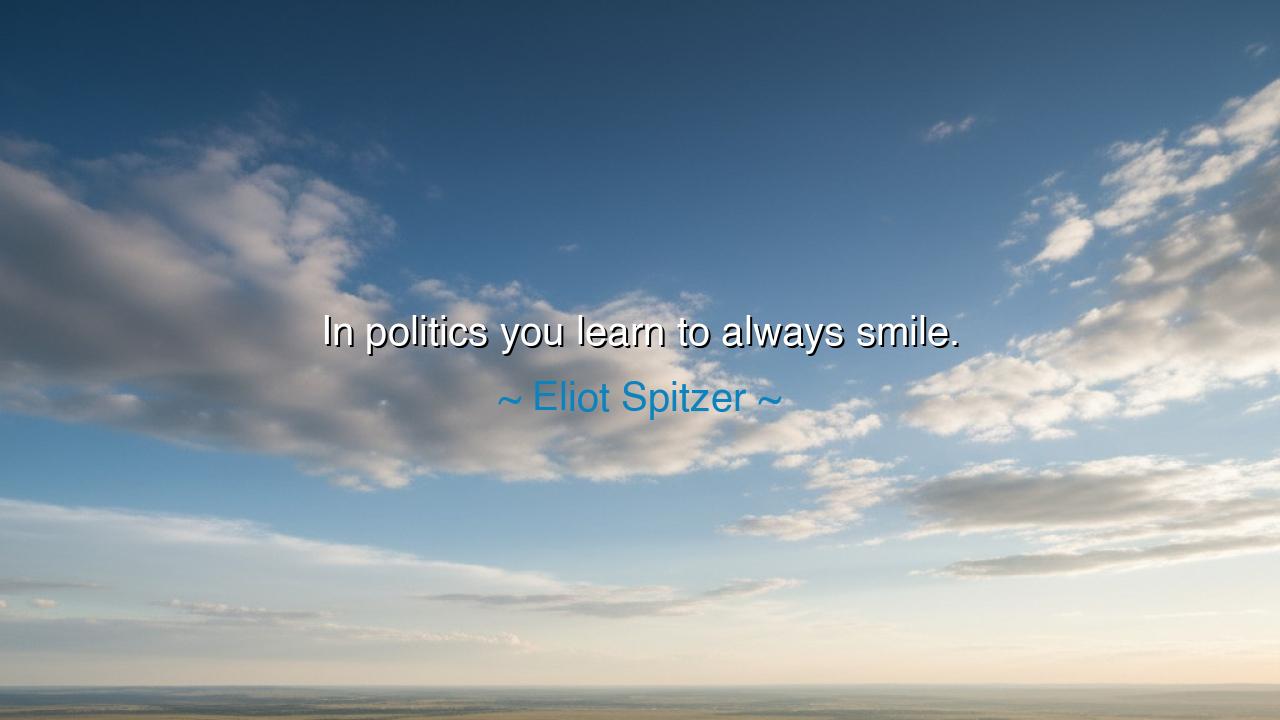
In politics you learn to always smile.






Hear the words of Eliot Spitzer: “In politics you learn to always smile.” This statement, brief and seemingly simple, carries the weight of centuries of governance, diplomacy, and survival in the realm of power. For the smile in politics is not only a gesture of warmth—it is armor, shield, and weapon. It conceals storms of anger, fear, and ambition, while projecting calmness and control. To always smile is to master the art of appearances, to tame one’s inner turmoil so that the people see only confidence and reassurance.
The ancients knew well the importance of the mask in public life. The Romans, who gave us the word persona, wore literal masks in theater and metaphorical ones in politics. A senator who quarreled bitterly in the chamber might step into the streets with a smile, for he understood that the citizenry needed not his rage, but the image of stability. In this way, the smile became a tool of leadership, a sign that no matter the chaos within, the state still stood firm.
Consider the tale of Abraham Lincoln, who bore the agony of civil war upon his shoulders. In private, he was burdened, sorrowful, sleepless; yet in public, he often greeted visitors with a story, a joke, and a smile. That smile did not erase the weight of war, but it gave courage to his people. By always smiling, he became a pillar of endurance for a nation in turmoil. Spitzer’s words echo this timeless truth: in politics, one must wield the smile as both comfort and disguise.
Yet the smile is not only for the people—it is also for adversaries. In courts, councils, and negotiations, the politician who frowns or reveals anger yields ground, for emotion exposes weakness. But the politician who smiles, even when threatened, declares silently: “You cannot shake me.” The smile becomes a mask of invincibility, a message that no insult, no challenge, no defeat can break composure. This is why Spitzer says one must “always” smile—for to falter even once is to reveal the crack in the armor.
But let us not forget: the eternal danger of the smile is that it may become deception, a mask worn too long until the true self is forgotten. History is filled with rulers who smiled to the people while plotting their ruin. Julius Caesar smiled to the senators who would strike him down; Neville Chamberlain smiled upon his return from Munich, declaring “peace in our time” when war loomed near. The smile can soothe, but it can also deceive. Thus, wisdom requires us not only to smile but to smile with integrity, so that the mask does not devour the face beneath.
The lesson for us is profound: whether in politics, in leadership, or in daily life, learn to master your expression. Let the smile be your shield in times of conflict, your gift in times of need, your steadying presence when others falter. But do not let it become a lie. Smile to give courage, not to manipulate; smile to unite, not to conceal treachery. In this way, the politician’s art becomes a human art—using calmness to overcome chaos, using warmth to bridge divides.
So let this wisdom endure: in politics you learn to always smile because the world is always watching, always measuring your strength by the face you present. Let your smile be not only a mask but a beacon, a reminder that even in the storm, dignity and composure prevail. And when you smile, let it carry truth, so that those who look upon you feel not deception, but hope. For the leader who smiles with sincerity commands not only respect, but trust—and that is the highest power of all.






AAdministratorAdministrator
Welcome, honored guests. Please leave a comment, we will respond soon